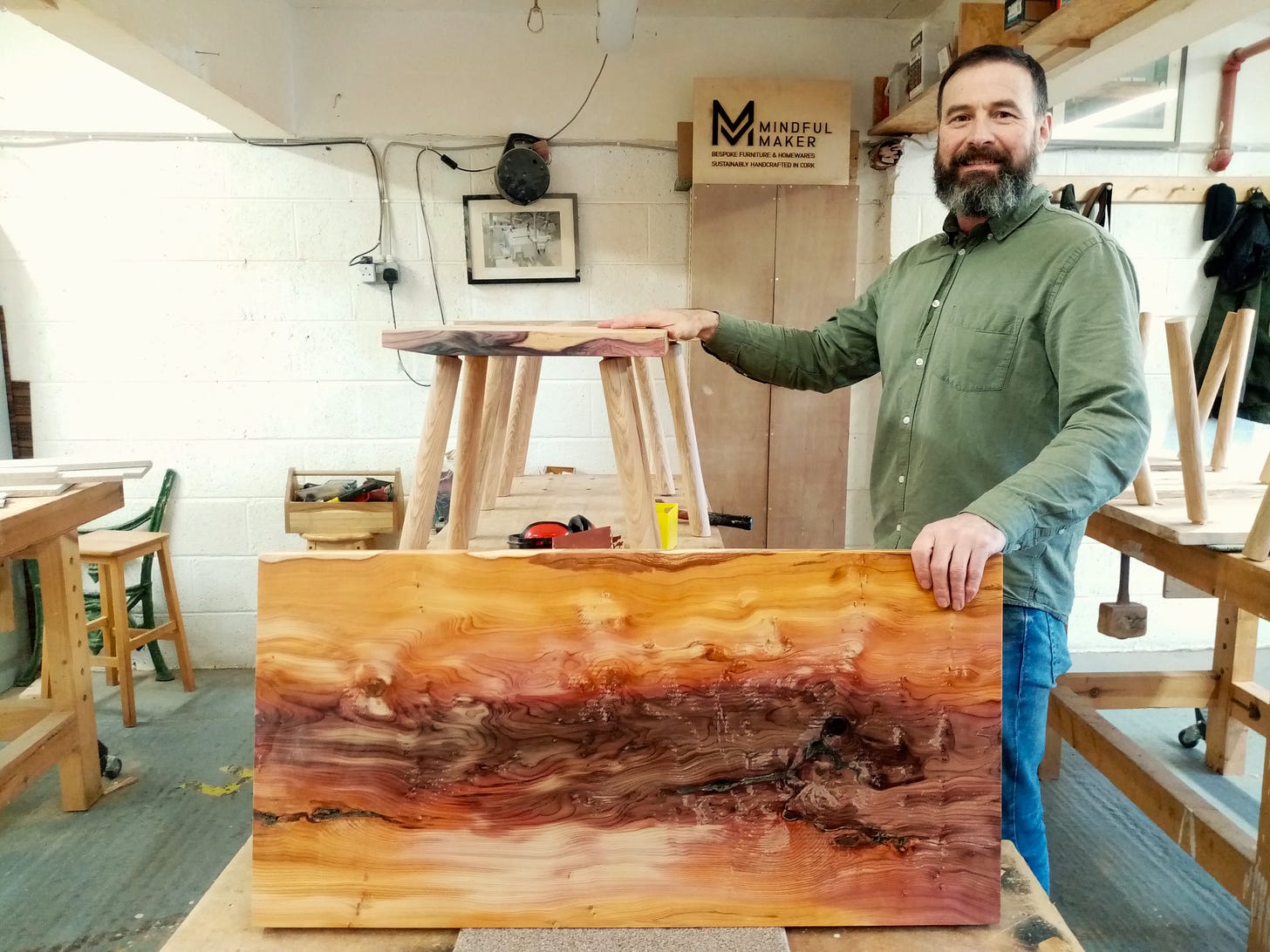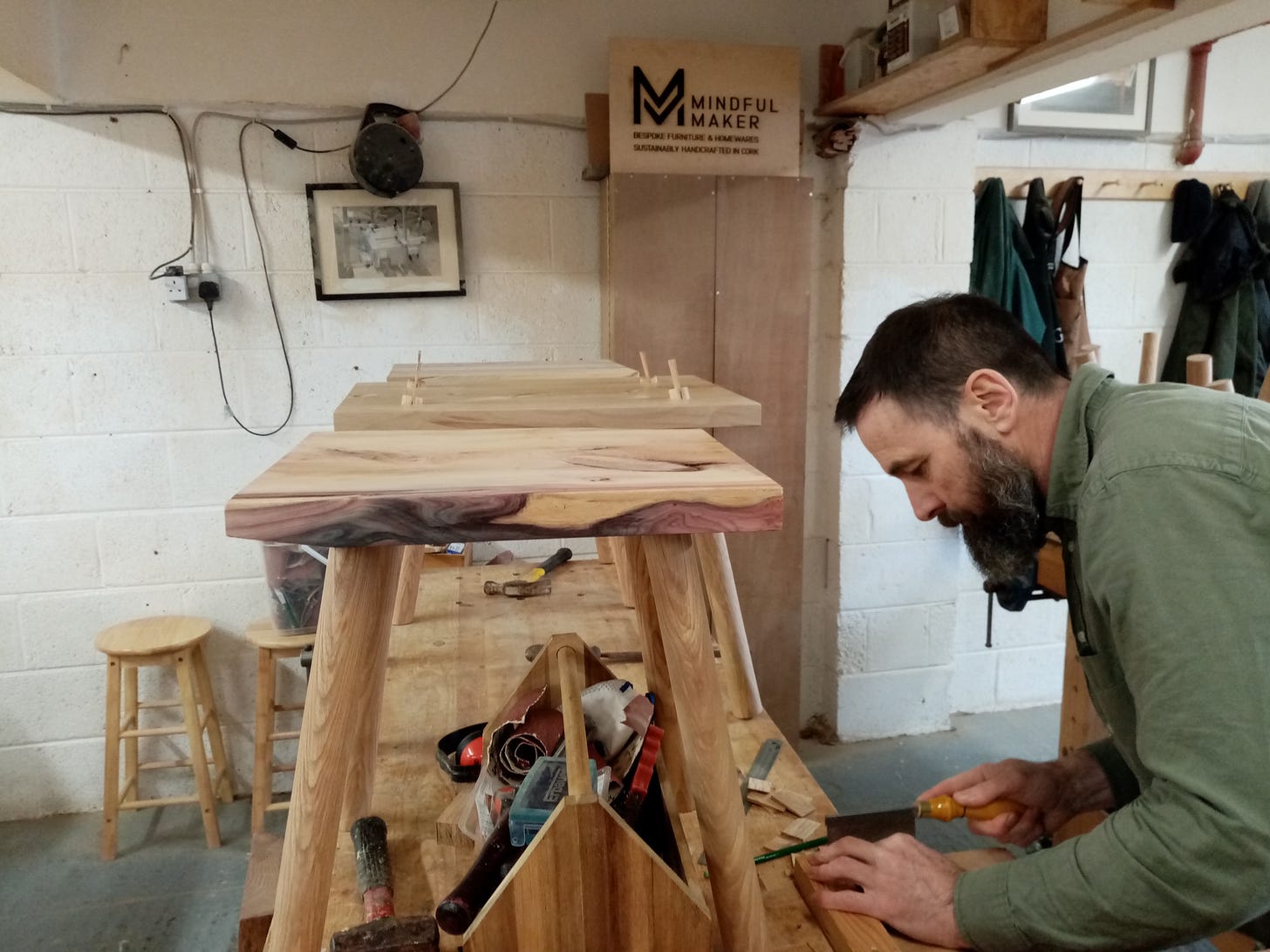The mindful craft maker
From his corner of Benchspace furniture maker, Paul Murphy is giving fallen trees a second life in the form of milking stools, benches and coffee tables.

Paul Murphy grew up on a farm on the Beara Peninsula. His father worked with stone. His uncle made lobster pots. There was no history of furniture making in the family, but as he says himself, “the material intelligence was always there.”
In 2017, Paul signed up to do the Furniture Design & Making course at CSN on the Tramore Road. After he finished, he set about starting up his own business called Mindful Maker, creating handmade pieces of furniture, using timber from native Irish trees that have fallen down naturally.
“Down in Beara, there is a tradition of gathering driftwood, known as “adhmad raice” in Irish, and I see a lot of resonance in that with what I‘m doing now; and I can see the stones and the rocks and the fields in the grain of the wood I use to make my pieces.”
“I love taking something that would otherwise have been burnt or rotted away and giving it a new lease of life. It’s a totally circular process using storm felled timber and is in keeping with my core values of heritage, tradition and sustainability.”
Paul makes anything from milking stools, to coffee tables to chopping boards, but where does he find the timber? Does he go out looking for fallen trees or what is the process?
“People contact me about a tree that might’ve come down and it’s lovely to get to be a small part of that story. The tree might’ve been used as a goalpost, or you might’ve cut your knee off of it or maybe someone had their first kiss beside that tree.”
“Recently a family called me and wanted me to make a piece for them and send it to one of their children in the States and then the story of the tree continues over there.”
Choosing what to do with each piece of wood isn’t always that straightforward however.
“It can take a while to decide what to do with a piece, sometimes I have to put it aside for weeks or months because it has its own personality. It can be cantankerous; it doesn’t want to be made into anything and that’s why I like the workshop when it is quiet, because sometimes the piece of wood will tell you what it wants to be.”
Paul now lives in Bandon, but for the last two years he has been operating in Benchspace, a workshop down in the Marina Park Industrial estate, which he shares with two other residents and there’s a fourth on the way soon.
“It’s been amazing to be able to work out of here and it has opened so many doors for me with local enterprise. It’s a great facility and the thing is, anyone can use it. If you have a project you’d like to work on, you can get a day pass, come down and use the workshop and if you’re stuck on something, you can ask one of us working here for a bit of advice.”
Running your own business comes with its own challenges of course, not that it seems to faze Paul so much.
“It can be tricky wearing so many hats, because I’m the maker, the accountant, I run the social media side of it and I’m working on a website which is coming soon, so there’s a lot of work involved, but it’s all really exciting.”
And what does he think about mass produced furniture? Does he feel he is in competition with the larger stores?
“Look, the likes of Ikea and other shops like that have a function, but their stuff isn’t going to last. It isn’t made to stand the test of time. Personally, I think it’s better to have fewer, but better things. What I make are heirloom pieces that can be passed down and will last for generations to come.”
Paul has three sons himself, Jack, Ciarán and Tomás, who are all very creative and he is keen for them to find their own way in the world, without pushing them in any one direction.
For anyone thinking about starting their own creative endeavor though, he has this short and simple advice:
“Find your own style, put your heart and soul into it and people will respond.”
But the conversation in the workshop keeps coming back to the trees and the wood and the craft; whether it’s how to use a foxwedge, or applying a layer of osmo oil on a finished piece to bring out the natural beauty of the timber.
“What we have in this country in terms of trees is very precious and I try to use every bit of it.”
“People say to me it’s great that you’re keeping the craft alive, but I see it as being the other way around and actually the craft has kept me alive, especially through difficult times in my life and I’m really grateful for that.”
Paul’s pieces are for sale in Cork Craft and Design Shop in Douglas and in Forest & Flock in Bantry.
For more info about Paul and his work, visit his Instagram page here.
Benchspace: A Made in Cork Revolution
In a small white-walled space not much bigger than a utility room, on the site of the old Ford car factory in Cork’s Marina Commercial Park, two crafters sit opposite each other, shoulders hunched and heads bowed as th…







This is such an inspiring story, Paul's handcrafted pieces look spectacular and have such a rich history, while also contributing to a reduction in waste material. Absolutely brilliant!